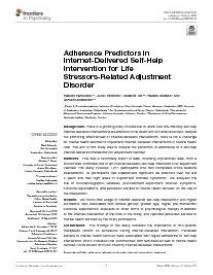Adherence Predictors in Internet-Delivered Self-Help Intervention for Life Stressors-Related Adjustment Disorder
Background: There is a growing body of evidence to show that low-intensity self-help internet-delivered interventions are effective in the treatment of mental disorders. Despite the promising effectiveness of internet-delivered interventions, there is still a challenge for mental health services to implement internet-delivered interventions in routine health care. The aim of this study was to analyze the predictors of adherence to a self-help internet-delivered intervention for adjustment disorder.
Methods: This was a secondary report of data, including unpublished data, from a randomized controlled trial of an internet-delivered self-help intervention for adjustment disorder. The study included 1,077 participants who had completed online baseline assessments. All participants had experienced significant life stressors over the last 2 years and had high levels of adjustment disorder symptoms. We analyzed the role of sociodemographic variables, pre-treatment adjustment disorder symptoms, outcome expectations, and perceived barriers to mental health services on the use of the intervention.
Results: We found that usage of internet-delivered self-help intervention and higher adherence was associated with female gender, greater age, higher pre-intervention outcome expectations, exposure to other forms of psychological therapy in addition to the internet-intervention at the time of the study, and reported perceived barriers to mental health services by the study participants.
Conclusions: The findings of the study indicated the importance of non-specific therapeutic factors on adherence during internet-delivered intervention. Perceived barriers to mental health services were associated with higher adherence to self-help intervention, which indicated that communities with restricted access to mental health services could benefit from low-intensity internet-delivered interventions.
Geachte bezoeker,
De informatie die u nu opvraagt, kan door psychotraumanet niet aan u worden getoond. Dit kan verschillende redenen hebben,
waarvan (bescherming van het) auteursrecht de meeste voorkomende is. Wanneer het mogelijk is om u door te verwijzen naar de bron
van deze informatie, dan ziet u hier onder een link naar die plek.
Als er geen link staat, kunt u contact opnemen met de bibliotheek,
die u verder op weg kan helpen.
Met vriendelijke groet,
Het psychotraumanet-team.
In: Frontiers in Psychiatry ISSN: 1664-0640 | 11 | 137
https://doi.org/10.3389/fpsyt.2020.00137
online: 13/03/2020


